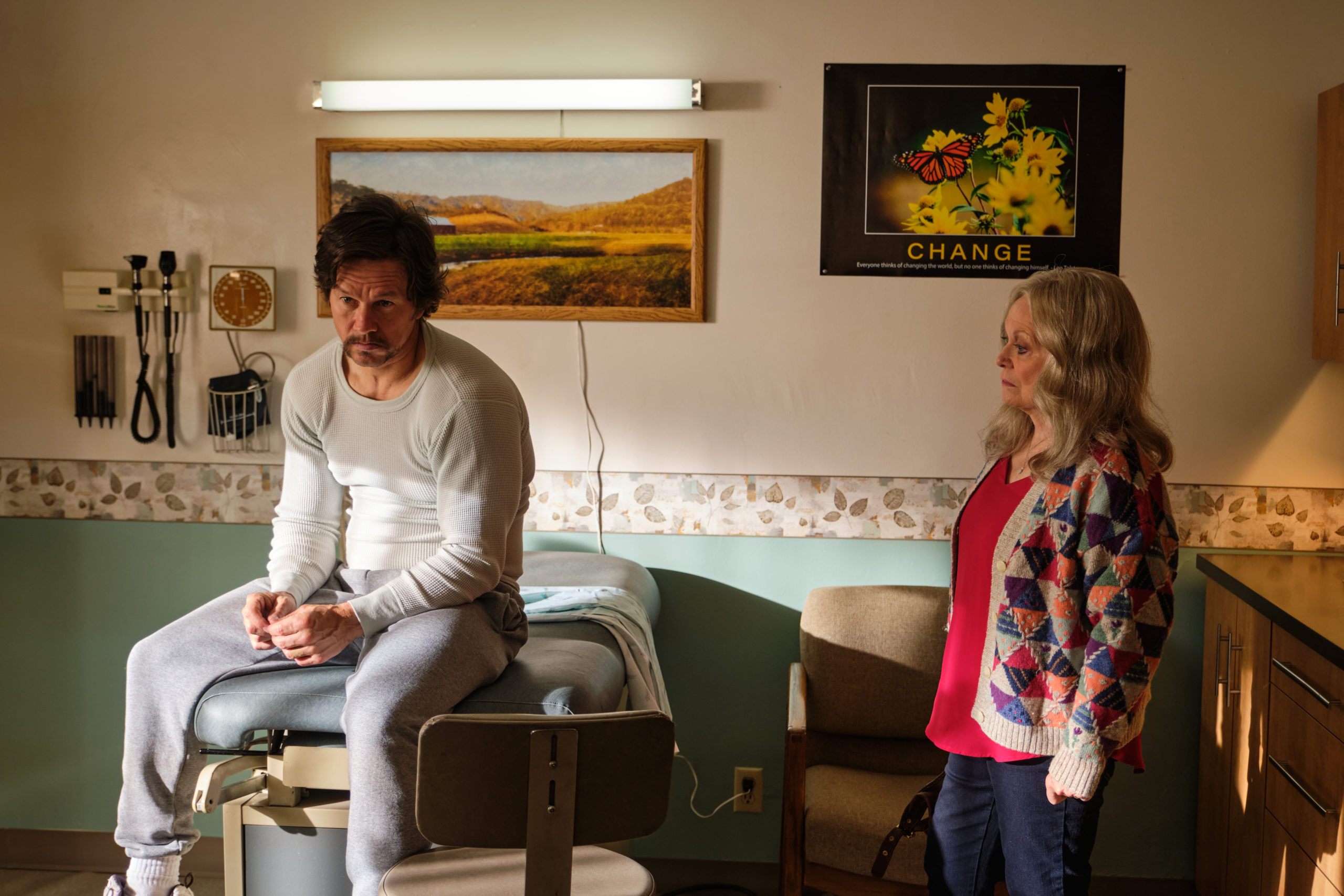If you take Father Stu on its own terms as a contemplation of an unpredictable life in multiple acts, you will be rewarded with a superbly performed and unabashedly moving picture. And why might one be tempted to not take the film on its own terms? To begin with, many out-of-the-gate cynical notices have expressed blanket skepticism with its supposed “faith-based agenda” in its portrait of one man’s spiritual epiphany, an obvious and too easy lens to apply to a movie that is, in truth, well-written, exceedingly earnest and, importantly, eschews preachiness.
Clearly such sentiments, recently shared with me by some reluctant viewers, are at least partially rooted in the offscreen baggage of Father Stu‘s two stars, Mark Wahlberg and Mel Gibson, the former having pledged his future career to faithful projects (while disavowing his career-launching performance in Boogie Nights) and the latter having run afoul of the law and moviegoers’ graces with public record incidents related to antisemitism and spousal battery. Both are also fiercely committed Catholics (Gibson a Traditionalist Catholic currently in pre-production for a sequel to his 2004 The Passion of the Christ). And both give equally committed performances here that are artistically unimpeachable.
Now that we have gotten this personal business out of the way, can we perhaps consider Father Stu objectively? A passion project for producer and star Wahlberg, it’s a movie about one of those too-odd-to-be-fiction lives just begging to be told, and one Wahlberg claims he was compelled to adapt from the moment he learned of one Father Stuart Long, a rough-and-tumble, working class Montana boxer of no means who hustled west to Hollywood in search of movie stardom before his journey took a detour into Catholicism and the priesthood. He died at age 50 of inclusion body myositis.
It’s a movie that Wahlberg largely financed with millions of his own money and a tailor-made role for the actor, and one that gives him so much life experience to play and so many comedic and emotional notes it ranks as the actor’s best work to-date (surpassing his Oscar-nominated work in The Departed). As a performer, his familiar stock-and-trade is typically a finite number of expressions as a brusque but accessible everyday guy, but here he digs deeper and performs at a higher level to deliver a real character, using his voice and body in ways previously unseen, both cocksure confident and touchingly vulnerable. He has stretched, or been liberated, and his work is the principal reason to see this picture, written and directed by first-timer Rosalind Ross.
With early origins as a potential collaboration between Wahlberg and his The Fighter writer-director David O. Russell, Ross took her own shot at developing the script and has delivered an involving, expansive, often funny and affecting story of an offbeat life in multiple acts, buoyed by her star’s brio and innate likability.
We first meet thirty-something Helena boxer Stuart Long in the ring, where he suffers an injury that effectively retires his career. His doting mother, Kathleen (the excellent Jacki Weaver), wants him to find direction, but his spark of inspiration to pursue television and movie acting isn’t exactly what she had in mind. He heads off to California and with much confidence and little success, taking a job at the meat counter of an L.A. grocery where he meets pretty, pious Mexican-American beauty Carmen, played by Teresa Ruiz in a lovely performance, who plays hard to get, at least before marriage, which is not in the cards for either.
After little success and a sexual proposition by a sleazy producer, Stu ultimately decides acting isn’t his calling; his alpha-male swagger in this casting couch moment may suggest a slight homophobia (or at least a knock on tarnished Hollywood mores) but is likely rooted in his embedded machismo, a quality the film suggests is both endearing and his Achilles heel; it gives him romantic appeal, gets him into bar fights and ultimately makes him accessible from the pulpit (or in a plainspoken penitentiary oration).
Undeterred by Carmen’s rejections, Stu feels the way to win her devout heart is to become a fixture at the parish and in her Sunday school class, wooing her by agreeing to get baptized and speaking broken Spanish to her watchful father. Like us, eventually she gives in to his charms. When a near-fatal motorcycle accident offers Stu a vision of transcendence in the form of the Virgin Mary, he turns toward the priesthood, effectively curtailing their growing romance while facing skepticism from his divorced parents, notably his gruff, damaged father, Bill (Gibson), a hard-drinking construction worker whose lifelong alienation from son Stu began when his favorite son died of a youthful illness. Stu also has to fight the rejections of the seminary, which doesn’t want to subsidize him, led by a terrific Malcolm McDowell as the monsignor towing the church’s line.
From here the film pivots into a third act crisis after Stu is diagnosed with the degenerative muscle disease myositis, and Wahlberg’s commitment to this debilitating development, in all Father Stu’s sorrow, confusion and search for reasons, is the best work the actor has ever done onscreen. Ever the fighter, Stu forges ahead, prognosis grim.
Interestingly, the film and character posit human suffering as the de facto, and only, route to the Divine (reinforced by real-life Father Stu testimony on the closing credits). Some may take issue with its embrace (Father Stu asks “why me?” but never “why?”) of agony as integral to salvation and the screenplay avoids inquiry into, perhaps, a broader view of deliverance. This traditionalism might be perceived as fundamentalist in its conviction that Stu’s salvation would be impossible without blanket acceptance of his disease and, later, excruciatingly crawling on his degenerated hands and legs to the altar, as if climbing the Holy Stairs (on his stomach rather than knees) for absolution. Such a strict view of redemption may strike some as too dyed-in-the-wool dogmatic.
Wahlberg’s scrappy performance covers so many bases with so much heart that he makes Father Stu worth seeing. And Gibson is in peak form here, giving us a long-suffering character who must face down his own demons of alcoholism and anger. You’d have to be a stone cold cynic to resist a late moment involving a wheelchair and a stalled truck on a country road. The film also contains thoughtful work by its supporting cast, including young actors Cody Fern and Aaron Moten as fellow seminary students whose loyalties philosophies are given voice and weight.
It’s important to remember that Father Stu is, primarily, the story of one person fighting his way through life and ultimately fumbling toward grace, and not a treatise on the glories of Catholicism (even if it does include a barroom, hippie Jesus facsimile dispensing unsolicited life lessons). There is a difference between a film that presents a serious-minded examination of individual awakening as one part of a life in sum and other recent, schematic films aimed at the Christian market that serve up heavy-handed proselytizing behind thinly veiled narratives. Ross and Wahlberg have clearly made the former.
After scores of performances, Father Stu finally converted me to the talents of Mark Wahlberg, which for me equals considerable enlightenment.
3 1/2 stars.



